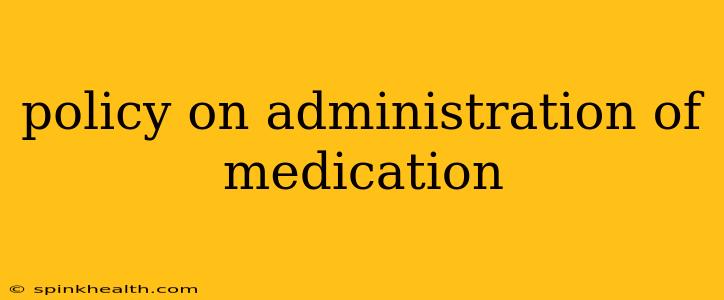The administration of medication, whether in a hospital, nursing home, school, or even at home, is a process fraught with potential pitfalls. A robust policy is crucial to ensure patient safety, legal compliance, and ethical practice. This isn't just about following rules; it's about safeguarding lives and upholding the highest standards of care. Let's delve into the key aspects of medication administration policies and answer some frequently asked questions.
What are the Key Components of a Medication Administration Policy?
A comprehensive medication administration policy encompasses several crucial elements. Think of it as a multi-layered safety net, designed to catch errors and protect patients at every stage. These core components usually include:
-
Medication Orders: Clear, concise, and complete orders from a licensed practitioner are the cornerstone. This includes the medication name, dosage, route, frequency, and duration of administration. Ambiguity is the enemy here; any uncertainty should be clarified immediately.
-
Five Rights of Medication Administration: This well-known mnemonic (Right Patient, Right Medication, Right Dose, Right Route, Right Time) acts as a fundamental checklist. But policies often extend this to include the "Right Documentation" and the "Right to Refuse," acknowledging the patient's autonomy.
-
Storage and Handling: Secure storage, proper handling, and appropriate disposal are paramount. Policies detail how medications should be stored, protected from light or temperature fluctuations, and ultimately disposed of safely and responsibly. This also includes measures to prevent medication errors caused by similar-looking packaging or labeling.
-
Documentation: Meticulous record-keeping is non-negotiable. Policies outline the required documentation for each medication administration, including the time, dose, route, and any observations made regarding the patient's response. Accurate documentation is crucial for legal compliance and continuity of care.
-
Emergency Procedures: Policies must detail how to handle emergencies related to medication administration, such as allergic reactions or accidental overdoses. This often includes clear protocols for reporting incidents and implementing corrective actions.
-
Training and Competency: Staff administering medications must receive adequate training and demonstrate competency. Regular competency assessments and continuing education are critical to maintaining a high standard of practice.
-
Policy Review and Updates: Medication administration policies aren't static documents. Regular reviews and updates are essential to ensure they remain current with best practices and regulatory changes.
What are the Legal Requirements for Medication Administration?
Medication administration is heavily regulated. The specific legal requirements vary depending on the setting and jurisdiction, but generally include:
-
Licensing and Certification: Individuals administering medications must hold the appropriate licenses and certifications.
-
Scope of Practice: Administrators must act within their defined scope of practice. Attempting to administer medications outside this scope can have serious legal consequences.
-
Reporting Requirements: Specific reporting requirements exist for medication errors, adverse events, and near misses. These reports are crucial for identifying systemic issues and improving safety.
-
Record Keeping Regulations: Strict record-keeping regulations ensure proper documentation of medication administration.
How Do Medication Administration Policies Differ Across Settings?
The specifics of medication administration policies differ depending on the setting:
-
Hospitals: Hospitals typically have the most comprehensive policies due to the complexity of patient care and the range of medications used.
-
Nursing Homes: Nursing homes also have detailed policies, often focusing on the specific needs of the elderly and those with chronic conditions.
-
Schools: School policies focus on the safe administration of medications to students with medical conditions, emphasizing parental consent and careful monitoring.
-
Home Care: Home care settings require policies that address the unique challenges of administering medications in a non-clinical environment, including security and patient education.
What Happens if a Medication Error Occurs?
Medication errors are a serious concern, and policies must include clear procedures for handling them. This typically involves:
-
Immediate Action: Taking immediate steps to mitigate any harm caused by the error.
-
Reporting: Promptly reporting the error to the appropriate authorities, following established protocols.
-
Investigation: Conducting a thorough investigation to determine the cause of the error and identify preventive measures.
-
Documentation: Detailed documentation of the error, the actions taken, and any follow-up steps.
Medication administration is a complex process demanding rigorous attention to detail. A well-defined policy is not merely a legal requirement; it's a vital tool for safeguarding patient safety and maintaining ethical standards. Remember, adherence to these policies isn't just about following rules; it's about protecting lives and upholding the highest standards of care.

